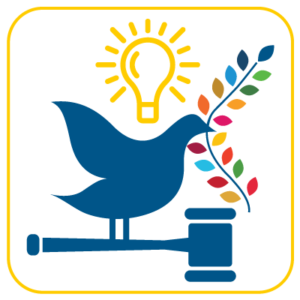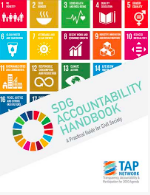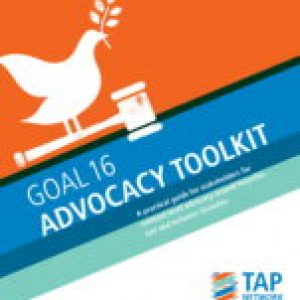Strategic litigation can be used as a tactic to push governments to implement SDG16+ targets that align with existing national laws or international obligations
Strategic litigation’ refers to public interest litigation that seeks to bring about a change in the law – e.g. clarifying, amending or overturning a law – by taking an individual case to court. The plaintiffs involved in strategic litigation cases are typically the victims of human rights or other violations, which are also experienced by other people. Thus, strategic litigation focuses on an individual case in order to bring about systemic change for a larger group of people.
Strategic litigation can be used to review the soundness, legality and constitutionality of public policies, laws and government conduct as it relates to SDG16+ implementation. Successful strategic litigation can result in a ruling by a court of justice that requires the government to take action in favour of more peaceful, just or inclusive societies. This ruling will remain the law of the land unless it is overruled by a higher court or struck down by the legislature. Strategic litigation has resulted in support for the constitutional right to freedom of information (SDG target 16.10). Similarly, anti-corruption advocates have taken cases to court to crack down on campaign financing by private sector donors (SDG target 16.5).1
While strategic litigation can be used as a means to advance SDG16+ implementation, it should generally be considered an option of last resort given its high costs, lengthy duration and need for legal expertise. There is also a risk of being unsuccessful or receiving an unfavourable ruling, which could actually impede SDG16+ progress. This risk is more likely to come to fruition in areas of law that are considered controversial – e.g. anti-corruption obligations – or where a case is being heard by a conservative court or one that lacks judicial independence.

Strategic litigation can be used as a tactic to push your government to fulfill its commitment to implement SDG16+, where there is an overlap between a SDG16+ target and the national or international law that applies in your country.
For example, the UN Convention on the Rights of the Child (CRC) – which has been ratified by nearly every country – can be used to uphold a government’s commitment to end violence against children (SDG target 16.2) given the significant overlap between the provisions of the CRC and SDG target 16.2. Where a government is slow in dedicating resources to end violence against children or where its actions undermine ending violence against children, litigation may be pursued to press the government to fulfill its legal obligations, thus furthering the implementation of target 16.2.
Civil society actors wishing to use strategic litigation as a means to progress SDG16+ implementation should consider taking the following actions:
TIP: 

TIP:
For assistance in identifying international agreements that overlap with specific SDG16+ targets, you can use the ‘Human Rights Guide to the SDGs’, the ‘SDG – Human Rights Data Explorer’ or the ‘Universal Human Rights Index’ (see the key resources section at the end of this chapter). These online resources allow you to identify links between your government’s human rights and labour standards obligations, and SDG16+ targets.
TIP: 

TIP:
There are groups who may be willing to provide free advice, such as the American Bar Association (ABA) or the International Development and Law Organisation (IDLO).
While the judicial enforcement of human rights or labour standards covered by SDG16+ can result in furthering peace, justice or inclusion, pursuing litigation is not without its challenges. Cases may not be able to be taken to court because certain rights are not legally recognized, or because courts lack the power or capacity to resolve certain issues. In many cases, it may be too costly for the people most affected by a given SDG16+ issue – especially those living in poverty – to pursue litigation to advance peaceful, just and inclusive societies. Moreover, in countries where the legal system is corrupt, subject to government influence, or virtually non-existent, litigation may just not be a realistic or viable option for those seeking to further SDG16+ implementation. In summary, although litigation can be a powerful means to achieve greater peace, justice and inclusion, it is y much more challenging to pursue in countries and contexts where peace, justice and inclusion are lacking.
SDG Accountability Handbook: A Practical Guide for Civil Society (TAP Network, 2018)
This handbook provides guidance on the different approaches and steps that can be taken by civil society to ensure national government accountability for the SDGs. It includes a chapter on ‘Pursuing Law Reforms, Strategic Litigation and Legal Empowerment.’ Available at: https://sdgaccountability.org/

Goal 16 Advocacy Toolkit (TAP Network, 2016)
This toolkit provides civil society and other non-governmental stakeholders with guidance on how to engage with their governments and other local, regional or international stakeholders to support the planning, implementation, follow-up and accountability of SDG 16. It includes a short section on ‘Undertaking Strategic Litigation.’Available at: https://tapnetwork2030.org/goal-16-advocacy-toolkit/

This online database allows users to identify the links between the SDGs or SDG targets and international and regional human rights instruments, labour standards and key environmental instruments (some of which have human rights dimensions). Available in seven languages.
Available at: http://sdg.humanrights.dk
This online database links recommendations and observations issued by international human rights monitoring mechanisms with the Goals and targets of the 2030 Agenda. Users can search for data by country, human rights mechanism, SDG or SDG target, and specific rights-holder groups. Available in the six official UN languages.
Available at: https://sdgdata.humanrights.dk/en/
This online database allows users to search the observations and recommendations of the UN treaty bodies, Special Procedures and the Universal Periodic Review (UPR) by country, region, mechanism, human rights theme, concerned persons/groups and SDG target. Available in the six official UN languages.
Available at: http://uhri.ohchr.org/en
Transparency, Accountability &
Participation (TAP) Network
Address: 205 E 42nd St.
New York, NY 10017
Email:
secretariat@tapnetwork2030.org